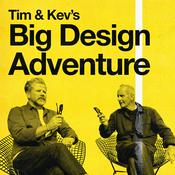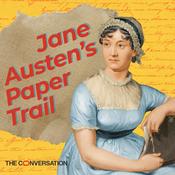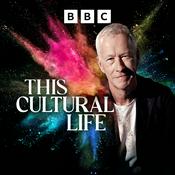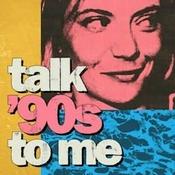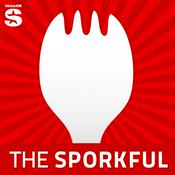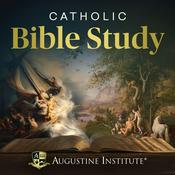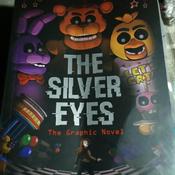The International Anthony Burgess Foundation Podcast
International Anthony Burgess Foundation

Latest episode
101 episodes
- In this episode, we are shedding some light on the conservation work currently ongoing in the Anthony Burgess archives. Andrew Biswell speaks with David Govier, an expert in the preservation of audio recordings at Manchester Central Library, who has been exploring ways in which to preserve and digitise the Burgess Foundation’s large collection of reel-to-reel and cassette tapes, some of which have not been heard for 50 years.
-----
LINKS
Manchester Central Library Sound Archive Blog
International Anthony Burgess Foundation
Burgess Foundation Free Weekly Newsletter
Burgess Foundation shop at Bookshop.org
Hosted on Acast. See acast.com/privacy for more information. - In 1984, Anthony Burgess published Ninety-Nine Novels, a selection of his favourite novels in English since 1939. The list is typically idiosyncratic, and shows the breadth of Burgess's interest in fiction. This podcast, by the International Anthony Burgess Foundation, explores the novels on Burgess's list with the help of writers, critics and other special guests.
In this episode, Graham Foster explores the military satire of The Anti-Death League by Kingsley Amis, with writer and academic Andrew James.
The Anti-Death League follows the soldiers of an army base that borders a quaint English village. They are preparing for the mysterious Operation Apollo, but there may be spies in their midst. As the preparations progress and the lives of the soldiers intersect with the inhabitants of the village, including a lustful aristocratic lady and a psychotherapist who may me more insane than his patients, Lieutenant James Churchill begins to question his purpose.
Kingsley Amis was born in 1922 in London. He wrote over twenty novels, the most famous being Lucky Jim, which also appears on Burgess’s list. He won the Booker in 1986 for The Old Devils and was knighted in 1990. He died in 1995.
Andrew James is currently a professor in the School of Commerce at Meiji University in Tokyo, where he conducts research in both literary biography and wine. He is the author of the books: Kingsley Amis: Antimodels and the Audience (McGill-Queen’s UP, 2013) and Bandol Wine and the Magic of Mourvèdre (Cambridge Scholars Publishing, 2023). His latest book is The Life of the Author: Graham Greene (Wiley Blackwell, 2025).
-----
BOOKS MENTIONED IN THIS EPISODE
By Kingsley Amis:
Lucky Jim (1954)
That Uncertain Feeling (1955)
Colonel Sun: A James Bond Adventure (1968)
Jake's Thing (1978)
Difficulties with Girls (1988)
By others:
A Clockwork Orange by Anthony Burgess (1962)
The Wanting Seed by Anthony Burgess (1962)
Honey for the Bears by Anthony Burgess (1963)
Albert Angelo by B.S. Johnson (1964)
A Vision of Battlements by Anthony Burgess (1965)
The Unfortunates by B.S. Johnson (1969)
Joysprick: An Introduction to the Language of James Joyce by Anthony Burgess (1973)
Earthly Powers by Anthony Burgess (1980)
-----
LINKS
The Life of the Author: Graham Greene by Andrew James
International Anthony Burgess Foundation
Burgess Foundation free weekly newsletter
The theme music for the Ninety-Nine Novels podcast is Anthony Burgess’s Concerto for Flute, Strings and Piano in D Minor, performed by No Dice Collective.
Hosted on Acast. See acast.com/privacy for more information. - In 1984, Anthony Burgess published Ninety-Nine Novels, a selection of his favourite novels in English since 1939. The list is typically idiosyncratic, and shows the breadth of Burgess's interest in fiction. This podcast, by the International Anthony Burgess Foundation, explores the novels on Burgess's list with the help of writers, critics and other special guests.
In this episode, Andrew Biswell explores the strange dystopia of The Old Men at the Zoo by Angus Wilson, with writer and academic Marina MacKay.
The Old Men at the Zoo is a novel of two halves. In the first, Simon Carter, secretary of London Zoo, is tempted by responsibility and power and forgoe his gifts as a naturalist. Yet, in their desire to set up a reserve for wild animals, the old men at the zoo are blind to the approaching chaos of nuclear war. In the second half, the zoo is taken over by a dystopian dictatorship and transformed into a concentration camp.
Angus Wilson was born in 1913. During the Second World War he worked as a codebreaker at Bletchley Park, after which he worked as a librarian in the British Museum’s Department of Printed Books. His first novel, Hemlock and After, was published in 1952 and was followed by seven more, including Late Call, which also appears on Anthony Burgess’s list. From 1966-1978 he was Professor of English at the University of East Anglia, where he co-founded, with Malcolm Bradbury, the famous Masters in Creative Writing. He was knighted in 1980 and died in 1991.
Marina MacKay is Professor of English Literature and a Fellow of St Peter’s College, University of Oxford. Her books include Modernism, War, and Violence (Bloomsbury, 2017) and Ian Watt: The Novel and the Wartime Critic (OUP, 2018). She is currently writing a book about British literature and culture in the 1950s.
-----
BOOKS MENTIONED IN THIS EPISODE
By Angus Wilson:
Anglo-Saxon Attitudes (1956)
The Middle Age of Mrs Eliot (1958)
Late Call (1964)
Diversity and Depth in Fiction: Selected Critical Writings (1983)
By others:
Northanger Abbey by Jane Austen (1818)
Bleak House by Charles Dickens (1853)
Our Mutual Friend by Charles Dickens (1865)
Strangers and Brothers by C.P. Snow (1940-70)
The Four Quartets by T.S. Eliot (1941)
Brideshead Revisited by Evelyn Waugh (1945)
A Dance to the Music of Time by Anthony Powell (1951-75)
The Novel Now by Anthony Burgess (1967)
Midnight's Children by Salman Rushdie (1981)
The White Hotel by D.M. Thomas (1981)
The Fourth Protocol by Frederick Forsyth (1984)
-----
LINKS
Modernism, War, and Violence by Marina MacKay
Ian Watt: The Novel and the Wartime Critic by Marina MacKay
International Anthony Burgess Foundation
The Burgess Foundation's free weekly newsletter
The theme music for the Ninety-Nine Novels podcast is Anthony Burgess’s Concerto for Flute, Strings and Piano in D Minor, performed by No Dice Collective.
Hosted on Acast. See acast.com/privacy for more information. - In 1984, Anthony Burgess published Ninety-Nine Novels, a selection of his favourite novels in English since 1939. The list is typically idiosyncratic, and shows the breadth of Burgess's interest in fiction. This podcast, by the International Anthony Burgess Foundation, explores the novels on Burgess's list with the help of writers, critics and other special guests.
In this episode, Graham Foster submits Philip Roth’s notorious novel Portnoy’s Complaint to examination with academic and writer Matthew Shipe.
Portnoy’s Complaint is structured as a monologue to a psychotherapist. Alex Portnoy reveals his inner life and obsessions, including his sexual predilections, his strange relationship with his mother, and his attendant feelings of shame. If the novel’s themes are shocking, Anthony Burgess praises Roth’s ‘great literary skill to make so fierce a theme the occasion for such uproarious comedy.’
Philip Roth was born in New Jersey in 1933. His first book was the story collection Goodbye, Columbus, which was released in 1959. He went on to write 28 novels, including The Human Stain, The Plot Against America, and American Pastoral, which won the Pulitzer Prize in 1997. Throughout most of his career, he taught comparative literature at the University of Pennsylvania. He died in 2018.
Matthew Shipe is a Teaching Professor in the English Department at Washington University in St Louis. He is the author of Understanding Philip Roth and the editor, with Scott Dill, of the collection Updike and Politics: New Considerations. In 2015, he won the John Updike Review's Emerging Writers Prize for his essay ‘The Long Goodbye: The Role of Memory in John Updike's Short Fiction.’ From 2016-2024, he served as the President of the Philip Roth Society. He currently serves as the co-executive editor of Philip Roth Studies and is on the Executive Board of the John Updike Society.
-----
BOOKS MENTIONED IN THIS EPISODE
By Philip Roth:
Goodbye, Columbus (1959)
Letting Go (1962)
When She Was Good (1967)
The Breast (1972)
The Ghost Writer (1979)
Zuckerman Unbound (1981)
The Counterlife (1986)
The Facts (1988)
Operation Shylock (1993)
Sabbath's Theater (1995)
American Pastoral (1997)
I Married A Communist (1999)
The Human Stain (2000)
The Plot Against America (2004)
Nemesis (2010)
By others:
Rabbit, Run by John Updike (1960)
Couples by John Updike (1968)
The Godfather by Mario Puzo (1969)
Fear of Flying by Erica Jong (1973)
The Coup by John Updike (1978)
Rabbit is Rich by John Updike (1981)
The Tunnel by William H. Gass (1995)
'Certainly the End of Something or Other, One Would Sort of Have to Think' in Consider the Lobster by David Foster Wallace (2005)
Dissident Gardens by Jonathan Lethem (2013)
Forest Dark by Nicole Krauss (2017)
Homeland Elegies by Ayad Akhtar (2020)
Small Rain by Garth Greenwell (2024)
-----
LINKS
Understanding Philip Roth by Matthew Shipe (affiliate link)
International Anthony Burgess Foundation
The Burgess Foundation's free Substack newsletter
The theme music for the Ninety-Nine Novels podcast is Anthony Burgess’s Concerto for Flute, Strings and Piano in D Minor, performed by No Dice Collective
Hosted on Acast. See acast.com/privacy for more information. - In 1984, Anthony Burgess published Ninety-Nine Novels, a selection of his favourite novels in English since 1939. The list is typically idiosyncratic, and shows the breadth of Burgess's interest in fiction. This podcast, by the International Anthony Burgess Foundation, explores the novels on Burgess's list with the help of writers, critics and other special guests.
In this episode, Will Carr heads to the dystopian future of Riddley Walker by Russell Hoban. His guide is writer and academic Graeme Wend-Walker.
Set 2000 years into the future, in an England dealing with the fallout from nuclear Armageddon, Riddley Walker concerns the adventures of a twelve-year-old as he discovers what lies outside his small community. The novel is narrated in an English that has degenerated over the years, so the reader discovers the world through a disorientating language. Burgess called the novel ‘a permanent contribution to literature.’
Russell Hoban was born in Pennsylvania in 1925. At the age of 18, he served as a radio operator for the US Army during World War II. After leaving the army, he made his name as an illustrator and an advertising copywriter. He began writing illustrated books for children in 1960. His first novel for adults was The Lion of Boaz-Jachin and Jachin-Boaz, published in 1973. He went on to write 15 more novels and more than 40 books for children. He died in 2011 in London.
Graeme Wend-Walker is a creative writer and a professor of literature at Texas State University. His scholarship is focused on writing for children and young adults, as well as science fiction, fantasy, and horror, and the folk traditions of Southeast Asia. His book Russell Hoban: Faithful to the Strange was published in 2025.
-----
BOOKS MENTIONED IN THIS EPISODE
By Russell Hoban:
How Tom Beat Captain Najork and his Hired Sportsmen (1974)
Kleinzeit (1974)
Turtle Diary (1975)
By others:
Things Fall Apart by Chinua Achebe (1958)
A Clockwork Orange by Anthony Burgess (1962)
Feersum Endjinn by Iain M. Banks (1994)
Katabasis by R.F. Kuang (2025)
What We Can Know by Ian McEwan (2025)
-----
LINKS
Russell Hoban: Faithful to the Strange by Graeme Wend-Walker
International Anthony Burgess Foundation
The Burgess Foundation's free Substack newsletter
The theme music for the Ninety-Nine Novels podcast is Anthony Burgess’s Concerto for Flute, Strings and Piano in D Minor, performed by No Dice Collective
Hosted on Acast. See acast.com/privacy for more information.
More Arts podcasts
Trending Arts podcasts
About The International Anthony Burgess Foundation Podcast
The International Anthony Burgess Foundation Podcast Channel hosts two podcasts:The International Anthony Burgess Foundation Podcast is dedicated to exploring the life and work of Anthony Burgess and his contemporaries, and the cultural environment in which Burgess was working. A combination of scripted episodes, interviews and lectures, this series is a resource for students, readers and anyone else interested in twentieth century literature, film and music. The International Anthony Burgess Foundation Podcast includes episodes on A Clockwork Orange and other novels written by Burgess, the influence of James Joyce, literary dystopias and utopias, and Burgess’s musical compositions among many other themes and topics.The Ninety-Nine Novels Podcast delves into Anthony Burgess's 1984 survey of twentieth century literature, Ninety-Nine Novels: The Best in English Since 1939. The book is a personal, and somewhat idiosyncratic, selection of Burgess’s favourite novels, and not only stimulates debate but acts as a crash-course in the literature that inspired and influenced Burgess throughout his career. The Ninety-Nine Novels Podcast invites experts to illuminate Burgess’s choices, and includes episodes on famous masterworks to unjustly forgotten gems.-----For more information about Anthony Burgess visit the International Anthony Burgess Foundation online. Hosted on Acast. See acast.com/privacy for more information.
Podcast websiteListen to The International Anthony Burgess Foundation Podcast, Big Design Adventure and many other podcasts from around the world with the radio.net app

Get the free radio.net app
- Stations and podcasts to bookmark
- Stream via Wi-Fi or Bluetooth
- Supports Carplay & Android Auto
- Many other app features
Get the free radio.net app
- Stations and podcasts to bookmark
- Stream via Wi-Fi or Bluetooth
- Supports Carplay & Android Auto
- Many other app features


The International Anthony Burgess Foundation Podcast
Scan code,
download the app,
start listening.
download the app,
start listening.

